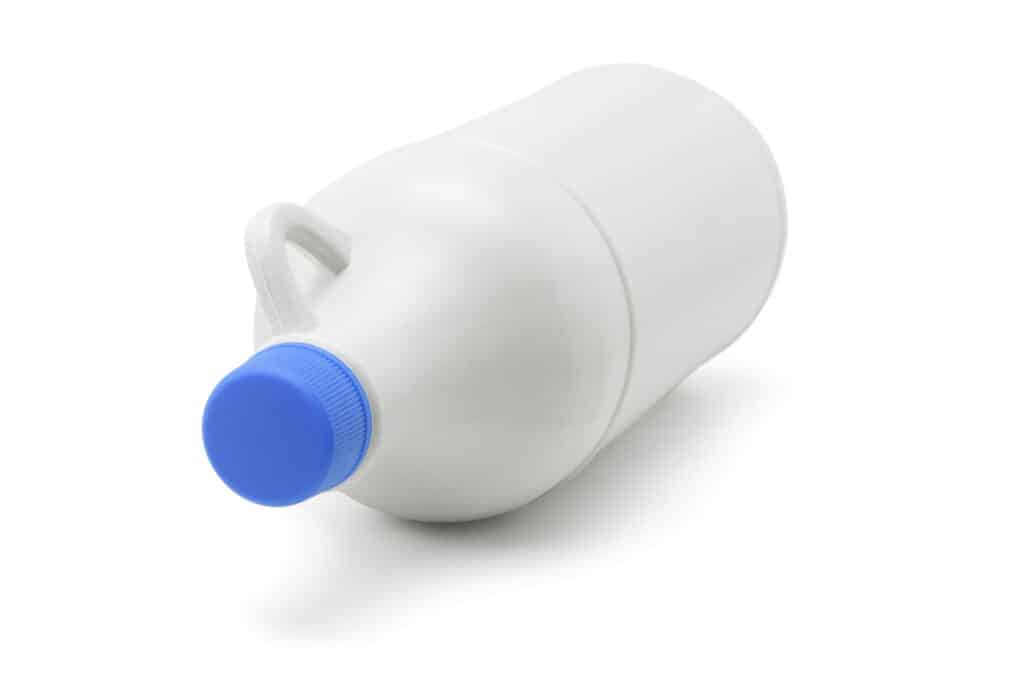You can use bleach to kill bushes and small plants. However, experts in horticulture and gardening advise against using it due to its harmful impact on the environment and people’s safety.
Adding some beautiful bushes can enhance the beauty of a garden or street. However, if you consider these plants as unwanted weeds in your outdoor area, it can be challenging to remove them.
You may have thought about using chemicals to eliminate them and wondered if you can use bleach to kill bushes like the bleach in your kitchen.
Killing small plants with bleach can be effective, but it’s important to note that it can also be dangerous. Bleach has the potential to destroy anything it comes in contact with.
If you must use bleach to remove stubborn shrubbery, there are safer methods that we will discuss shortly.
Before we do so, let’s first explore the chemical process through which bleach works as a killer.

Related Reading: Does Pressure Washing with Bleach Kill Grass?
Table of Contents
How Does Bleach Kill Bushes?
Many people know that bleach is toxic to humans.
It can also be harmful to plants because of its high pH level.
This alkaline pH is what makes it deadly. Although it doesn’t leave a burn on plants like it does on humans, it can still be deadly.
Plants require a specific PH range to grow well.
If the soil is too acidic or too alkaline, the plant will not thrive and may eventually die.
Pouring bleach into the soil can be harmful to plants as it can seep into the ground and kill the plant through its roots.
That’s why you can use bleach to kill bushes, but you should think about it first.
Pouring bleach into the soil can have a harmful impact as it produces salt as a by-product when it breaks down.
This salt can make the soil unsuitable for plant life due to its osmotic effect.
This effect causes the salt to draw water out of the roots, preventing the plants from getting enough water to survive, ultimately leading to their death from dehydration.
Please note that while using bleach to kill bushes may be effective, it is not recommended.
However, if you are attempting to kill plants with dense root networks, bleach will not be effective.
In such cases, pouring large amounts of bleach on the soil to eradicate every root in the network will result in the garden not growing anything for several months.
These are some plants bleach will not be effective against:
- Ivy
- Brambles
- Knotweed
Please be cautious when using bleach as it can also function as a weed killer.
If used carelessly, bleach may render gardens incapable of growing anything for several months until the chemicals have fully dissipated and been washed away.
You can definitely see it is possible for bleach to kill bushes, but using caution is paramount.
How to Use Bleach to Kill Bushes
If you have made it this far and are still considering using bleach in your garden, there are some safety tips recommended by gardeners that you should follow.
1. Restrict Its Usage
It’s important to avoid reckless use of bleach in your garden as it can kill the soil for months.
Only use bleach in small amounts and try to limit its use to cracks in paving.
Test its effectiveness on a small area before using it on a larger scale.
Don’t experiment with the entire bush as it may harm other plants in your garden.
2. Prevent Bleach From Spreading
When using herbicides, it’s best to minimize the impact on the surrounding environment, except for the target plants.
If you choose to use bleach, it’s important to apply it on a calm and sunny day.
A good point to consider is the effect of wind when using bleach for spraying.
If wind is present, it could cause the bleach to land on areas where it is not needed.
Additionally, if rain is expected, the bleach could be carried through the soil by the water.
To prevent the spread of bleach, it is advisable to wait a few days before removing dead weeds.
3. Protect Your Family
Please keep in mind that bleach can be extremely harmful to both humans and pets.
To ensure your safety, it is important to wear protective gloves and eyewear while using bleach.
Additionally, it’s important to keep your loved ones, including pets, away from the area where bleach has been sprayed until it has completely dried.
4. Do Not Spray Anywhere Near Water
As previously advised, it’s important to refrain from using bleach near water sources or aquatic environments.
Bleach can easily seep into the environment through water, which can have harmful consequences.
So, even if there’s a troublesome bush near your pond, it’s best to avoid using bleach altogether.
5. Do Not Mix With Other Chemicals
This is a crucial matter to be aware of. Bleach is highly toxic even without combining it with other chemicals.
However, individuals who are not well-versed in chemistry may mistakenly believe that mixing two potent chemicals will create an even stronger one, which can be extremely hazardous.
Bleach does not play well with others and here are some examples of hazardous chemical combinations:
- Mixing bleach and ammonia is a hazardous combination. Ammonia is often found in herbicides, so it’s important to avoid using bleach if you have recently used a herbicide containing ammonia. Mixing these two substances can create chloramine, which can harm your lungs.
- Some websites suggest using vinegar as a natural herbicide instead of harsh chemicals like bleach. However, it is important to note that mixing bleach and vinegar can create toxic chlorine gas. This gas was used in WW2 gas bombs to harm people, so it’s best to avoid any accidental mixing of these two substances.
- Using alcohol as a pesticide is not a recommended method, while some sources suggest it. However, it is important to note that if you have tried this and are considering using bleach afterwards, it may cause a significant problem. This is because bleach and alcohol can generate toxic chloroform, which can be harmful.
If you’re still willing to use bleach to get rid of unwanted bushes in your garden, you can dilute it and spray it on the affected area using a spray bottle.
You can also pour it undiluted into the cracks between hard surfaces like paving or slabs.
Related Reading: Can You Use Bleach to Pressure Wash a House?
Conclusion
Using bleach to kill bushes may seem like a viable option, but it is important to consider the consequences.
Bleach is a potent killer of both plants and animals, and its effects on the soil can be long-lasting.
The high pH and salt by-products that result from bleach breakdown can make it difficult for anything to grow in the soil for several months.
It is crucial to weigh the costs and benefits before using bleach as a plant killer.
If you decide to utilize bleach as a herbicide, it is crucial to take proper precautions.
Firstly, ensure that you and your loved ones are protected by wearing appropriate gear.
Secondly, keep your family at a safe distance.
Thirdly, use bleach sparingly and avoid mixing it with any other chemicals.
Fourthly, do not use bleach near any water source.
Finally, apply it on a day with calm weather, so it can dry without being carried away by the wind or rain, and avoid spreading into the external environment.
As always, safety first!
Enjoy living the outdoor life!!!
